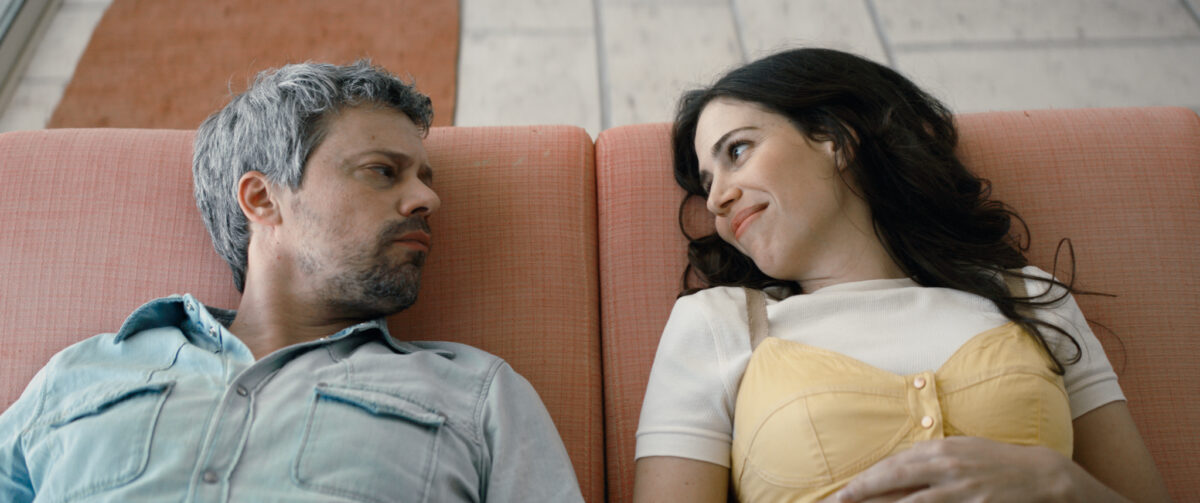“Ahed’s Knee” – Definitely not Claire’s [MOVIE REVIEW]

Avshalom Pollak as Y in “Ahed’s Knee.” Photo courtesy of Kino Lorber.
More an art installation than a film, Israeli writer/director Nadav Lapid has given us his rage in freeform. Autobiographical, Lapid begins his canvas with the metaphorical story of West Bank Palestinian teenager Ahed Tamini, famous or infamous, depending on your point of view, for slapping an Israeli soldier when he raided her home. Labeled a terrorist for this act, she was sent to prison and then, following her release, kept under house arrest. A prominent member of the Knesset, the all-powerful Israeli legislature, was quoted as saying she should be shot in the knee so that her house arrest would be permanent. It was this quote that inspired Y, the fictional stand-in for Lapid, to decide to make his next film about this incident, or more specifically about the ugly message directed at a teenager. Lapid is not advocating a pro- or anti- Palestinian policy. He is enraged by the fascist turn of his government that has upended him and his values.
As he contemplates the significance of the suppression of dissent, an unusual offer comes in. The Deputy Director of Libraries, a division of the Israeli Ministry of Culture, has invited him to present his latest film in the tiny desert village of Arava. That the government would pay his expenses to fly to a remote village and show his movie is not unusual. Bringing culture to the people is a way to make them feel more connected. Arriving in this no man’s land, Y is greeted by the incredibly young and charming Yahalom, the aforementioned Deputy Director of Libraries. Now based in Jerusalem, this is the village where she grew up and she has always loved his films.
She is young, sweet, and charming. She’s also the representative of a repressive organization that demands that he sign a contract where he agrees only to speak about approved topics and nothing else. There will be no payment if he does not comply with the government’s edict. Oh, and if he veers off the straight and narrow, he will no longer be eligible for funding on his future projects. Y’s feeling of helplessness is compounded by the impending loss of his mother to cancer. They were collaborators on his films and she helped keep him grounded. His rage grows in direct proportion to his powerlessness.
Although there is a story as a backbone to the film, Lapid, who lived almost all these events, uses Y as the outlet for his rage. Nothing much happens. Y takes a day trip into the desert where he encounters a beauty that is in direct contrast to the reality of life in present day, oppressive Israel. Expositional in nature, “Ahed’s Knee” is all conversation, a contemplation of the state of affairs where dissent is no longer tolerated, and democracy is shrinking with the demand of unwavering loyalty to the government’s dictates.

Avshalom Pollak as Y and Nur Fibka as Yahalom in “Ahed’s Knee.” Photo courtesy of Kino Lorber.
Inspired by the philosophical dialogues between an older man and a young woman in “Claire’s Knee” by Eric Rohmer, Lapid tries to engage the young librarian in discussing how she has come to support the autocratic leanings of a Culture Ministry that clearly undermines creativity and is, ironically, anti-culture. The inherent fear in her responses and the vapidity of her sweet demeanor only underscore his helplessness and serve to enrage him further. Their discourse verges on absurdist comedy.
Lapid, in the guise of Y, has been backed into a corner. The country he loved is no longer that country. The reasons may be varied, and in some cases understandable, but the totalitarian path is one he cannot countenance.
When I stated that this was installation art, it is because of the rage that permeates everything. Lapid has painted all the surfaces in the glowing embers of his angry rants. This film is a Rothko of warm, hot, and flaming reds. Here anger is not just an emotion or a frustration, it is a character unto itself.
The actors are fine. Nuance is not the strong suit of this film so character development is rather lacking. Neither Y nor Yahalom is expected to grow or change. Yahalom knows full well what she is doing; having a job is more important than believing in one. Y was angry at the beginning, as shown by his distress over the reaction to Ahed, and is angrier at the end. Avshalom Pollak as Y is purposefully antagonistic and livid. Nur Fibak as Yahalom is wide-eyed and sincerely insincere.
Lapid has given us an insider’s view of what he sees as a descent into autocracy in Israel without tolerance for opposing views. His anger and distress are against a nativist policy that would condone or even encourage repression of its own citizens. Nuance, in short supply, seems unnecessary.
In Hebrew with English subtitles.
Opening April 1 at the Laemmle Royal, Laemmle Glendale, and the Laemmle Pasadena Playhouse.


